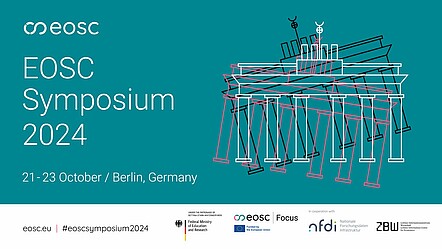No data without software! Vote for the NFDIxCS session at EOSC Symposium 2024
The EOSC Symposium 2024 will take place in Berlin from October 21-23.
Until April 26 you can vote for the session "No data without software!", proposed by NFDIxCS, NFDI4DataScience, Software Heritage Foundation and FAIRCORE4EOSC.
EOSC Symposium 2024 will take place under the patronage of the German Minister for Education and Research Bettina Stark-Watzinger. The event is being organised by the EOSC Association, the EOSC-A German Mandated Organisation, NFDI, the ZBW – Leibniz Information Centre for Economics, an EOSC-A Member, and with the support of the Horizon Europe project EOSC Focus.
In order to capitalise on the synergies between the EOSC and NFDI communities, NFDI will hold a meeting with representatives of its community and other relevant stakeholders back-to-back to the EOSC Symposium to facilitate collaboration between the target groups.
There will be six unconference sessions as part of the symposium. Among other highlights, the joint contribution "No data without software!" from NFDIxCS, NFDI4DataScience, Software Heritage Foundation and FAIRCORE4EOSC has been accepted as part of the open vote where the EOSC community decides which sessions they’d like to see featured at the Unconference. Voting will close on Friday 26 April at 5 pm CET.
Please vote for the proposal (no. 15) via the EOSC Website: https://eosc.eu/symposium2024/
Thank you very much for your support!
Session description:
Research software is pivotal for long term archival of research data especially for reproducibility and reuse. By offering this workshop, the importance of supportive infrastructure wrt. software becomes visible. Moreover, there is a need to strengthen the discussion about the specific profile of software wrt. long-term preservation and its later use. The interactive discussion will help not only to understand the concepts, but also the design of services, tools and infrastructures that support scientific processes in more user-centric approach.
In a short introductory presentation, the audience will dive into two topics: (1) the role of software in scientific processes and (2) the profile of software and development processes required to achieve reproducibility and reuse of related research data. This will include
descibing semantically the research process, archiving software and reopening time-capsules after a long time period. While guiding through these topics, an interactive format will be used to give the audience the possibility to talk about existing experiences and pain points from (not) using long-archiving infrastructure. Lowering barriers, involving as many perspectives as possible from various scientific fields, could help to gather requirements and sharpen the idea of a supportive research environment. The goal is to refine the needs for sustainable research software development within and across scientific disciplines, and to elaborate on related future infrastructure and methodological developments by reflecting on these needs.


